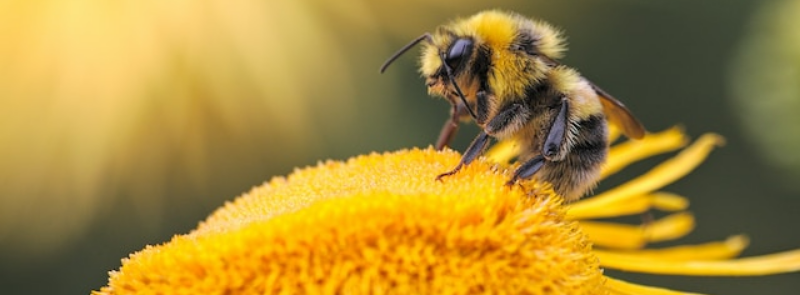
When It Occurs
Annually Third Saturday in August
Timeline
Days Passed (554)
# Hashtags
#NationalHoneyBeeDay #HoneyBees
World Honey Bee Day falls on the third Saturday in August, a buzzing celebration for beekeepers, honey enthusiasts, and the flourishing natural world. #WORLDHONEYBEEDAY commemorates not only the vital role of honey bees but also honors the dedicated beekeepers caring for their hives. The day encourages support for locally sourced honey, inviting everyone to relish and purchase this golden nectar.
Origins and History
The origins of National Honey Bee Day reflect a growing awareness of the importance of bees and beekeeping:
- Establishment: National Honey Bee Day was first observed in 2009. It was initiated by beekeepers to educate the public about the importance of honey bees and the need to protect them. The day also aims to highlight the contributions of beekeepers to agriculture and the environment.
- Growing Popularity: Since its inception, the day has gained popularity, with beekeepers, environmentalists, and nature enthusiasts participating in various activities to celebrate and promote the welfare of honey bees.
The Significance of Honey Bees
Honey bees are vital to our ecosystem and agriculture for several reasons:
- Pollination: Honey bees are among the most effective pollinators. They are responsible for pollinating approximately one-third of the food crops we consume, including fruits, vegetables, nuts, and seeds. Without bees, many of these crops would struggle to produce.
- Biodiversity: By pollinating a wide variety of plants, honey bees help maintain biodiversity in ecosystems. This biodiversity is crucial for the health of the environment and the stability of food supplies.
- Honey Production: Honey bees produce honey, which has been used by humans for thousands of years as a natural sweetener and for its medicinal properties. Honey also supports local economies, particularly in rural areas where beekeeping is a traditional practice.
- Economic Impact: The pollination services provided by honey bees contribute billions of dollars to the agricultural industry each year. Their role in crop production is vital for the economy.
Threats to Honey Bees
Honey bees face several significant threats that impact their populations and health:
- Pesticides: Exposure to certain pesticides, particularly neonicotinoids, can be harmful to bees, affecting their ability to forage and reproduce.
- Habitat Loss: Urbanization and agricultural expansion have led to the loss of natural habitats for bees, reducing the availability of foraging resources.
- Disease and Parasites: Honey bees are susceptible to various diseases and parasites, such as the Varroa destructor mite, which can devastate bee colonies.
- Climate Change: Changes in climate patterns can affect the availability of flowers and the timing of blooming, disrupting the foraging patterns of bees.
Ways to Celebrate National Honey Bee Day
There are many meaningful and fun ways to celebrate National Honey Bee Day:
- Learn About Bees: Educate yourself about honey bees, their role in the ecosystem, and the challenges they face. Books, documentaries, and online resources can provide valuable insights.
- Support Local Beekeepers: Purchase honey and other bee products from local beekeepers. This supports their efforts and encourages sustainable beekeeping practices.
- Plant Bee-Friendly Gardens: Create a bee-friendly garden by planting flowers that provide nectar and pollen for bees. Choose native plants and avoid using pesticides.
- Build Bee Habitats: Install bee houses or create habitats that provide shelter for bees. This can help support wild bee populations.
- Participate in Beekeeping: Consider becoming a beekeeper or supporting local beekeeping associations. Many organizations offer courses and resources for those interested in starting beekeeping.
- Raise Awareness: Use social media to share information about the importance of honey bees and how people can help protect them. Use the hashtag #NationalHoneyBeeDay.
- Host Events: Organize or participate in events such as workshops, educational talks, or community planting days to raise awareness and celebrate honey bees.
Fun Facts About Honey Bees
- Honey Bee Species: There are seven species of honey bees, with the most common being the Western honey bee (Apis mellifera).
- Busy Bees: A single honey bee can visit up to 5,000 flowers in a day. They are incredibly efficient pollinators.
- Honey Production: To produce one pound of honey, honey bees must visit approximately 2 million flowers and fly a collective distance of around 55,000 miles.
- Complex Communication: Honey bees communicate with each other through the "waggle dance," a movement that conveys information about the direction and distance of food sources.
Conclusion
National Honey Bee Day is a vital celebration that highlights the importance of honey bees to our ecosystem, agriculture, and economy. By learning about honey bees, supporting local beekeepers, planting bee-friendly gardens, and raising awareness, we can all contribute to the protection and preservation of these essential pollinators. On the third Saturday of August, take the time to appreciate the hardworking honey bees and the many benefits they provide, ensuring a sustainable future for both bees and humans.


